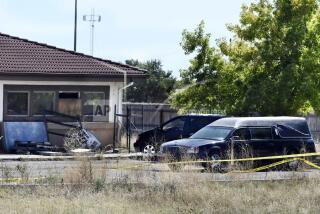Crematory Ignored ‘Sacred’ Obligation, Court Told
- Share via
ROME, Ga. — The onetime operators of the Tri-State Crematory -- where hundreds of rotting bodies were discovered in 2002 -- ignored their “sacred obligation” of caring for the dead, a plaintiffs’ attorney said Wednesday as a civil trial got underway.
“Duty, responsibility and respect -- that’s what the case boils down to,” said Kathryn Barnett, who is representing nearly 1,700 family members. The Marsh family, which ran the now-closed facility, “treated the remains as no more special than a piece of gravel or a blade of grass,” Barnett said.
But after opening statements and testimony from just one prosecution witness, court was adjourned to discuss a possible settlement in the case. The two sides previously had been close to an agreement, but the proposed $3.5-million settlement fell through because the Marsh family’s insurance company would not cover it.
The plaintiffs earlier reached a $36-million settlement with 58 funeral homes that had sent bodies to the crematory. Attorney Robert Darroch said that most of the relatives taking part in the suit had received checks ranging from $5,000 to $100,000.
In February 2002, responding to an anonymous tip, authorities found heaps of bodies at the Tri-State Crematory -- a business that served Georgia, Alabama and Tennessee and had been run by the Marsh family since 1982. The number of discarded corpses, some inside body bags, still wearing hospital gowns, eventually climbed to more than 300.
Behind the scandal was a well-respected local family.
Brent Marsh, 30, who had taken over the crematory business in the late 1990s, had been a college football star. His mother was a high school teacher and a fixture in the local Democratic Party; his father, Ray Brent Marsh, was a successful businessman.
In her opening statement, Barnett described Tri-State Crematory as a business that was slipshod from the moment the elder Marsh “set up shop in his backyard” in rural Noble, Ga., with used equipment and no training. He “slowly passed the reins” to his son, she said. Ray Marsh died last year.
Barnett warned jurors that the case would be “hard to hear, worse to see.” She described bone fragments belonging to one of the 100 people whose bodies had never been identified -- an elderly woman who probably had arthritis.
“We will never know who she was, but we know that somebody loved her,” Barnett said.
Attorney Frank Jenkins, who is representing the Marsh family estate, said there was no evidence that Ray Marsh was responsible for dumping the bodies. He described the elder Marsh as a careful steward of a “rural family business” valued by customers because it was not expensive.
But Marsh’s health began declining dramatically in 1994, Jenkins said, as he suffered strokes, had heart surgeries and eventually was afflicted with dementia. Only then did the business unravel, Jenkins said. When Brent Marsh took over, Jenkins said, oversight of the crematory changed.
“There is a distinction between the two,” he said.
A Florida mortuary officer who visited the Tri-State Crematory property as part of a federal cleanup team described it as being in a “bad state of repair.” The sides of the crematory had large cracks, and fluids from bodies had leaked onto the floor, said Charles Brewer, a witness for the prosecution.
Brent Marsh also faces 787 criminal charges, including abuse of a corpse, making false statements and burial service fraud. That trial is scheduled for October.
Sloan reported from Rome and Barry from Atlanta.
More to Read
Sign up for Essential California
The most important California stories and recommendations in your inbox every morning.
You may occasionally receive promotional content from the Los Angeles Times.













